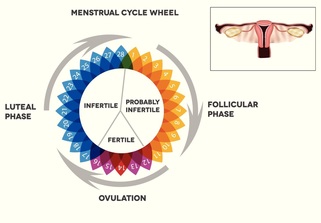
The menstrual cycle is counted from the first day of one period to the first day of the next. Most women have a period every 21 to 35 days that lasts about two to seven days. A woman’s menstrual cycle may be regular, occurring at the same interval and lasting about the same length of time every month or may be irregular.
Irregular menstrual bleeding comes in many forms, and varies from woman to woman. You may experience spotting, mid-cycle bleeding or very heavy bleeding. The time between your periods may lengthen, shorten or become unpredictable. The way in which your cycle is “irregular” is unique to you, but the underlying cause is often the same, and rooted in hormonal imbalance. The good news is it’s possible to naturally restore your hormonal balance and so the regularity of your menstrual cycle.
The most common causes of irregular periods that I see at my clinic are:
Stress. Our adrenal glands are responsible for regulating cortisol levels, which have a direct impact on some of the hormones involved in menstruation such as estrogen and progesterone. The adrenals increase cortisol production in response to stress. Unfortunately, most women suffer from chronic stress that overburdens the adrenals and can lead to adrenal dysfunction. The resulting cortisol imbalance leads to changes in estrogen and progesterone levels. Healing your adrenals is essential for regaining the hormonal balance necessary for regular periods.
PCOS. Women with polycystic ovarian syndrome (PCOS) usually do not ovulate regularly. Since regular periods depend on regular ovulation, one of the most common signs of PCOS is irregular bleeding. One of the main contributing factors in PCOS is insulin resistance. High insulin prevents ovulation and stimulates the ovaries to produce more hormones called androgens. Hormonal imbalance in PCOS leads to obesity, acne, polycystic ovaries, hirsutism, infertility and high cholesterol.
Hypothyroidism. Thyroid function is intimately connected with all of your body’s hormones. When your thyroid hormones are off balance such as with hypothyroidism, it can result in a wide range of symptoms, including irregular periods, fatigue, weight gain, and depression.
Perimenopause. Perimenopause is the stage of a woman’s reproductive life when the ovaries gradually begin to produce less estrogen, which eventually lead up to menopause. Menopause occurs when it has been 12 consecutive months since a woman’s last period. Women may experience irregular cycles five, ten or even fifteen years prior to reaching menopause.
All of these conditions are rooted in hormonal imbalance, and fortunately there is a lot we can do to regain hormonal balance naturally. My unique approach to balancing women’s hormones is to address the root cause and collectively balance the endocrine system as a whole. With this collective approach, women experience healthy hormone balance and lasting health results.
In Best Health,
Dr. Linda Gedeon
Irregular menstrual bleeding comes in many forms, and varies from woman to woman. You may experience spotting, mid-cycle bleeding or very heavy bleeding. The time between your periods may lengthen, shorten or become unpredictable. The way in which your cycle is “irregular” is unique to you, but the underlying cause is often the same, and rooted in hormonal imbalance. The good news is it’s possible to naturally restore your hormonal balance and so the regularity of your menstrual cycle.
The most common causes of irregular periods that I see at my clinic are:
Stress. Our adrenal glands are responsible for regulating cortisol levels, which have a direct impact on some of the hormones involved in menstruation such as estrogen and progesterone. The adrenals increase cortisol production in response to stress. Unfortunately, most women suffer from chronic stress that overburdens the adrenals and can lead to adrenal dysfunction. The resulting cortisol imbalance leads to changes in estrogen and progesterone levels. Healing your adrenals is essential for regaining the hormonal balance necessary for regular periods.
PCOS. Women with polycystic ovarian syndrome (PCOS) usually do not ovulate regularly. Since regular periods depend on regular ovulation, one of the most common signs of PCOS is irregular bleeding. One of the main contributing factors in PCOS is insulin resistance. High insulin prevents ovulation and stimulates the ovaries to produce more hormones called androgens. Hormonal imbalance in PCOS leads to obesity, acne, polycystic ovaries, hirsutism, infertility and high cholesterol.
Hypothyroidism. Thyroid function is intimately connected with all of your body’s hormones. When your thyroid hormones are off balance such as with hypothyroidism, it can result in a wide range of symptoms, including irregular periods, fatigue, weight gain, and depression.
Perimenopause. Perimenopause is the stage of a woman’s reproductive life when the ovaries gradually begin to produce less estrogen, which eventually lead up to menopause. Menopause occurs when it has been 12 consecutive months since a woman’s last period. Women may experience irregular cycles five, ten or even fifteen years prior to reaching menopause.
All of these conditions are rooted in hormonal imbalance, and fortunately there is a lot we can do to regain hormonal balance naturally. My unique approach to balancing women’s hormones is to address the root cause and collectively balance the endocrine system as a whole. With this collective approach, women experience healthy hormone balance and lasting health results.
In Best Health,
Dr. Linda Gedeon
 RSS Feed
RSS Feed

